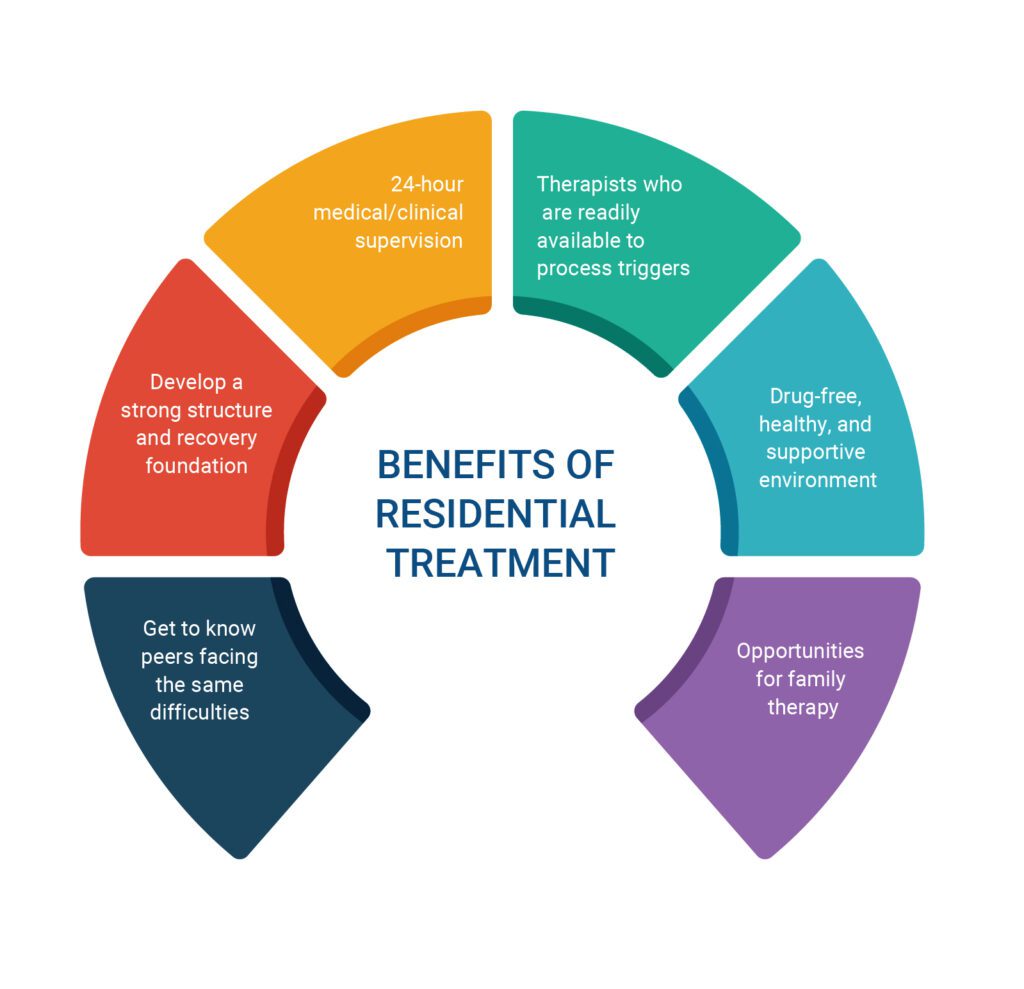Substance abuse is a severe and complicated mental health disorder that requires a team of professionals to address the physical, mental, and emotional effects. Without a well-rounded treatment plan, many people will find it extremely difficult to recover from substance misuse. They will also be at a higher risk of relapse, which can heighten the risk of overdose.
There are many avenues one can take with drug addiction treatment, including outpatient programs that allow them to recover at home. Some may attempt a self-guided approach, but it can prove dangerous due to the intense withdrawal symptoms and how difficult it is for one to change their habits in the same environment that made them sick.
Across the board, residential drug treatment centers are considered the most effective way to overcome a substance use disorder while ensuring the patient’s safety, comfort, and the best care. If you’re interested in learning more about how a residential treatment program works, this is what you need to know.
Find the location that works for you.

What is Residential Care?

Residential treatment, also known as residential care, might sound like an outpatient program that takes place in the patient’s home. However, it is located in a non-hospital facility that’s designed to create a casual, home-like environment for patients to restore a sense of calmness, control, and positive outlook.
One of the biggest advantages of a residential treatment facility is that they provide 24-hour supervision by caring medical professionals. These residential treatment centers are very similar to an inpatient rehab center. They also offer:
- mental health services,
- family therapy,
- group therapy,
- and a range of other supports.
These will help you get through the detox process and recover from drug abuse and other substance abuse with the greatest chance of success.
Even within a residential facility, you still have multiple drug and alcohol rehab treatment options to choose from. For instance, the level of care you choose to receive will depend on your state of being, the strength of the substance you were previously using, and how long you were using that substance.
Ultimately, no matter what situation you find yourself in, residential facilities are some of the best-equipped treatment centers for supporting people of all ages.
Services of Residential Care

The 24-hour care aspect of a residential treatment facility may seem intimidating or restricting at first, but once a person enters the facility and gets to know the staff and fellow patients, it becomes apparent that these treatment centers are designed for comfort, peace, and successful drug and alcohol addiction recovery.
The importance of 24-hour care, particularly for those with severe substance use disorders such as prescription opioid misuse, is that it prevents any inner or outer influence from promoting relapse. Instead, those inside of a treatment facility are surrounded by like-minded individuals who are just as determined to recover as you are.
Beyond supervision, a residential care facility provides a range of around-the-clock services provided by knowledgeable, empathetic professionals. Some of the services you might utilize include behavioral health therapy, which can help change your habits and recognize impulses, along with mental health treatment, which can help address the complexities of recovering from addiction along with any co-occurring disorders.
Residential treatment facilities also invest in experiential therapies, which can be useful for minimizing the side effects of withdrawal or helping you overcome disabilities, mood disorders, and other conditions that contributed to or were worsened by your addiction.
How Long Does Drug Addiction Treatment Last?
There is no one-size-fits-all answer when it comes to how long residential treatment lasts. Addiction treatment varies widely from one individual to the next because the best care is completely customized to you, your lifestyle, and your goals.
With that said, there are a few different paths you can take when pursuing residential treatment, and they will determine how long your stay is within the group home.
1. Short-Term Programs
Short-term programs may last as few as 21 days, but may go up to 90 days in length. There will not necessarily be a set departure date when you begin your plan. More than likely, your providers will leave it open-ended and adjust your plan as your well-being improves. Meanwhile, you may also enter into a long-term residential treatment plan, which may involve a stay of up to 6-12 months.
2. Long-Term Programs
Generally, long-term residential treatment plans are more intense and are ideal for people who may have struggled with relapse in recent years or those who have co-occurring disorders, such as bipolar disorder, which put them at a higher risk of relapse.
If you do not have a supportive home life, a longer-term treatment plan may be recommended to give you the best possible chance at lasting recovery. In the meantime, your team might work with you on stabilization (e.g., helping improve relationships through family therapy or helping you prepare to move out of the home) so that when you do leave residential care, you are entering a healthy environment that’s easier to transition into.
What’s The Difference Between Inpatient and Residential Treatment?
When exploring a treatment option such as residential care, it might seem like residential treatment and inpatient treatment are the same thing. However, they have critical differences. While residential care is a type of inpatient treatment, a residential treatment facility is not a hospital. If a referral suggests inpatient care, they likely are talking about a hospital facility that can provide 24-hour medical monitoring and more intensive treatment.
While it’s true that a residential treatment facility does provide 24-hour monitoring, it is generally not to the same degree as an inpatient facility. For instance, residential treatment is not able to provide the level of medical monitoring that may be necessary for severe withdrawal symptoms like frequent seizures during detox.
Inpatient care tends to offer short-term acute care, whereas residential treatment may last for a few weeks, a few months, or be completely open-ended, depending on the patient’s needs. In many cases, a person might transition to a residential facility after completing an inpatient program.
Benefits of a Residential Treatment Program
There is no doubt that the safe environment that residential treatment provides is crucial to the success of many patients, especially those in the at-risk category. To fully understand the value of what a residential treatment facility offers, here are some of the key advantages:
1. Better Environment
Patients are placed in an environment without temptation or negative influence.
2. Access to Professionals
Therapists and other professionals are readily available to discuss experiences, sensations, and feelings.
3. Supervision
With 24-hour supervision, the potentially life-threatening side effects of the detox process can be mitigated quickly and much more safely than if the patient were at home.
4. Family Support
Family and peers are encouraged to be involved in the recovery process, and services such as family therapy can help them do so in a healthy way.
5. Co-Occurring Mental Health Services
Co-occurring issues, such as eating disorders and mental illness, can also be addressed by psychiatry professionals and other providers during treatment.

If you want to continue on the path to recovery, it might be time to learn more about residential treatment and how it can help you avoid relapse, set goals, and unlock the life you want. Get in touch with Zinnia Health today to learn more.
How The Residential Treatment Process Works
If you have never been to a residential treatment facility, and perhaps never pursued any other type of substance abuse treatment, it can be overwhelming to think about the process. To help you better understand how residential treatment can help you, here’s an overview of what to expect.
1. Arrival
When you first arrive at your residential treatment programs, a member of the staff will invite you to sit down and provide some information about your current situation. Some of the information they’ll want to collect, in addition to information regarding your substance use, includes past health history, any known mental health issues, and any concerns you have.
2. Initial Consultation
During the initial consultation, you can also expect to be asked about your support group, as this is an important part of determining how to proceed with your treatment plan. Since residential facilities tend to take a more holistic approach to treatment, they will need to know if you are able to count on your family for support, or if family therapy might be part of the process.
3. Customized Treatment Plan
Once they have an idea of what your needs are, the staff will work together to create a customized treatment plan design specifically for you. The treatment plan may include help with behavioral problems, skills training to help you transition back into the workforce or home life, and on-going help from mental health professionals to help you stay focused on the goals and values you’ll be discussing during treatment.
4. Transition
As you transition out of residential treatment, you may be entered into a program with a sober living environment or another facility for on-going support service for mental health disorders, whether it’s cognitive behavioral therapy or just group therapy with other peers who are in the same stage of recovery as you.
5. Aftercare
Continuing life after residential rehab and initial transition won’t be perfect. While your severe to moderate withdrawal symptoms may be over with and any mental health conditions have been treated, there may still be urges to use. Your support system will be invaluable and help you continue a drug-free life.
The experts at Zinnia Health understand substance addiction and will help you continue to seek treatment at all stages of recovery.
Alternatives to Residential Drug Treatment

If you’re looking for help with the recovery process, you’ll be glad to know that there are far more options available to you than just residential treatment. Each path has its own advantages and considerations, but once you get help choosing the one that’s right for you, you’ll be that much closer to lasting recovery.
Some of the most common alternatives to residential treatment include:
1. Outpatient Treatment
Outpatient care can look very different depending on the supports that a person has in place. It could be entirely self-guided, where someone quits cold turkey and tries to stay clean. More often than not, though, they will enlist support from healthcare providers and attend regular visits to check-in on their mental and physical health.
The chance of success with outpatient treatment depends entirely on how strong of a support system the person has, and how healthy their home environment is for them.
2. Intensive Outpatient Programs
One step up from outpatient treatment are intensive outpatient programs. While these still require the patient to have a healthy home and support network, they’ll ultimately get more professional input as they’ll be asked to attend multiple visits with healthcare professionals each week, while also attending group sessions or other forms of mental health services.
3. Inpatient Treatment
Inpatient treatment takes place in a hospital setting, and it is considered the highest level of care. With medical staff around you at all times, you will be monitored for mental and physical well-being and provided with resources to keep you safe and comfortable. These programs are short-term and typically transition you into one of the other options, like residential treatment.
If you need help choosing the type of treatment that best fits your life, Zinnia Health can help.
Take The First Step Towards Recovery
Admitting that you have an addiction is hard, finding the right people who can help you overcome it can feel impossible. At Zinnia Health, we believe that every patient has the right to customized care, provided by experienced professionals who will treat them with respect, kindness, and empathy.

Are you ready to take the next step toward recovery? Reach out to Zinnia Health today to get started, call (855) 430-9439.

